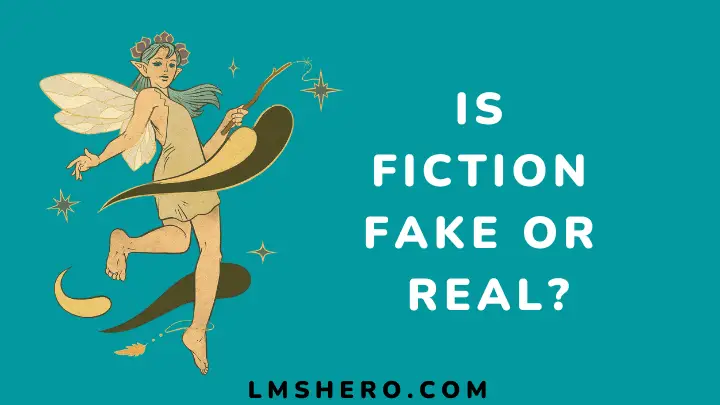Many articles on the internet try to share perspectives about whether fiction is fake or real and that all of the stories we read, watch, or hear are just made up. But is fiction fake? Or is it just different from reality?
There is no agreed-upon definition of “fiction”, and the boundary between what is considered fiction and what is not is constantly shifting. It can be difficult to tell the difference between reality and fiction, especially when it comes to news stories, novels, and TV series.
In recent years, there has been an increasing trend in the media to treat science fiction as real, even if they are not. This has led to a lot of confusion among the public. In this article, you will find out if fiction is real or fake.
What is fiction all about?
Fiction is a story that is created from the author’s imagination. Fiction is any form of narrative that involves invented or imagined people, events, and/or places.
It may be written as a novel, play, poem, short story, or movie script. Fiction can help us better understand the world through imagination and creativity.
Writers create fiction to explore and escape the realities of their everyday lives. They can find hope, comfort, salvation, and catharsis by exploring different worlds, characters, and ideas.
With every page turned or every scene, they help us see the world in a new way and learn something new.
What is the difference between fiction and nonfiction?
Fiction is created to be enjoyed – it’s meant to be relished, not taken seriously. It’s a way to escape reality and explore new realms, which can be funny, heartwarming, exciting, or anything else.
Nonfiction, on the other hand, is meant to be learned from. It’s a way to understand the world around us and be inspired by the stories told. The main difference between fiction and nonfiction is the intention of the author.
Fiction writers invent or create an entirely new story that did not happen, while nonfiction writers try to tell a true story as accurately as possible. It can be factual or based on true events, but at its heart, it’s a way to learn.
Fiction differs from non-fiction because it does not tell true events and facts. However, fiction authors always strive to make their stories seem believable and realistic even though the author makes them up.
Types of fiction by genre
1. Historical fiction
Historical fiction is a type of fiction genre that typically features stories that are set in the past. Most historical novels are written as nonfiction, but others are written in a novel style.
Historical fiction is set in any period from antiquity to the modern day. Some authors make up fictional characters and events, while others base their work on real people and true events.
Some popular historical fiction stories include Kristin Hannah’s The Nightingale, Leo Tolstoy’s War and Peace, and the gladiator.
2. Horror
Horror is a fiction genre that elicits fear and terror from its readers or viewers. Such stories are often meant to be shocking and have various themes.
In horror, there are no limits on what can happen to a person. Some popular horror stories include Stephen King’s The Shining, Edgar Allan Poe’s The Raven, and Bram Stoker’s Dracula.
3. Romance
Romance fiction is a type of fiction that often has a love story as the main plot. These novels typically have an alpha male character and an alpha female character who are romantic leads.
The alpha male is typically strong, intelligent, powerful, and good-looking while the alpha female is usually beautiful, kind, and intelligent.
The alpha male will pursue the alpha female until she gives in to his romantic feelings for her. Some popular romance fiction stories include Jane Austen’s Pride and Prejudice, and Jane Austen’s Sense and Sensibility.
4. Mystery or suspense
Mystery or suspense fiction, also called thriller, is a genre that emphasizes the mysterious and the suspenseful.
The most common mystery fictions are whodunits. Whodunits are stories where the reader tries to figure out who committed the crime.
Mystery novels are popular because they allow readers to use their deductive reasoning to predict the next line of action.
Mystery and suspense are two of adults’ most popular types of literature. However, not all mysteries are thrillers.
5. Science fiction and fantasy
Science fiction and fantasy are two of the most popular types of fiction. The two genres have much in common but offer different perspectives on life.
It can be difficult to tell the difference between science fiction and fantasy if you’re not an avid reader. Science fiction is a genre that deals with the exploration of advanced science, space exploration, time travel, parallel universes, and extraterrestrial life.
Fantasy is more about exploring characters with fantastical abilities who live in a world that’s removed from reality.
Is fiction real or fake?

It is common for people to ask themselves if fiction is real or fake. There are many ways of looking at fiction. Some people think that all fiction is fake.
Others believe it’s only up to the reader to decide whether a story is true. After all, fiction can be genuine, at least in how it makes you feel. There’s room for both opinions.
However, fiction is the art of creating an imaginary world to place the real one. Hence, fiction is fake.
How can fiction be used to explore real-world issues?
Fictional stories are a great way to explore real-world issues such as climate change, unemployment, education, and what it means to be human.
They can also be used to explore the human experience, from love and loss to racism and sexism. Fiction can play a huge part in our lives by helping us understand different cultures worldwide and how they live.
Fiction can help us understand why people behave the way they do and why some things happen.
We can explore our emotions, beliefs, and values with fiction by seeing how other people deal with them through their experiences on stage or page.
Fiction can also be used to explore real-world issues more personally. For example, John Green’s The Fault in Our Stars examines the challenges faced by teenagers with cancer.
Green doesn’t shy away from tough topics like death and grief in this story. But he also creates relatable characters who are emotionally invested in their fate.
This writing is powerful because it allows readers to share the characters’ pain and progress. Ultimately, any novel can be used to explore a variety of complex social issues.
What matters most is that readers are engaged and exposed to new ideas. With a little effort, anyone can find a novel that resonates with them and helps them learn something new.
What is the future of fiction?
The future of fiction is exciting and limitless. In the future, people will increasingly rely on stories to help orient themselves in the world.
They will find meaning in them and use them to process their experiences. This way, fiction will become an even more important part of people’s lives.
There are many new and innovative ways to tell stories and endless possibilities. With the help of technology, authors can reach a wider audience than ever before, and readers can easily explore different genres and worlds.
In the coming years, we expect to see even more groundbreaking works of fiction, and we hope you will join us in supporting them.
FAQs
Are there any similarities between fiction and non-fiction?
Both can explore new perspectives, provide insight into the human experience, and offer solutions to social problems.
What is best for kids, fiction or nonfiction?
Some kids prefer reading fiction because it lets them escape from reality. Other kids prefer reading nonfiction because it helps them learn about the world around them. It all depends on what a child is interested in.
What is the best genre of fiction to write?
There’s no one “right” answer to this question, as the best genre of fiction to write depends on what you enjoy reading and what your goals are for writing.
However, some common genres of fiction that might be appropriate for novice writers include science fiction, mystery, and romance.
Conclusion: Is fiction real or fake?
Fiction is fake. However, as humans, we are constantly learning and growing. We are constantly evolving and changing, and the form that our fiction takes is reflective of this.
In an era where technology constantly expands and changes our lives, our fiction must also reflect this.
Today, there are more diverse ways for readers to consume content than ever before, and fiction must be able to accommodate this.
Hence, writers must continue to experiment and push boundaries to satisfy the ever-growing desires of readers.
Some people often rely on some of their fictional characters to ease their stress or find comfort when things get tough. These characters are known as comfort characters.
For more information about this form of emotional support system, read the article on comfort characters.
Thanks for reading.







